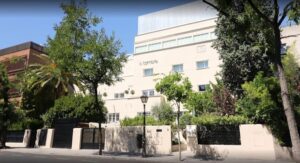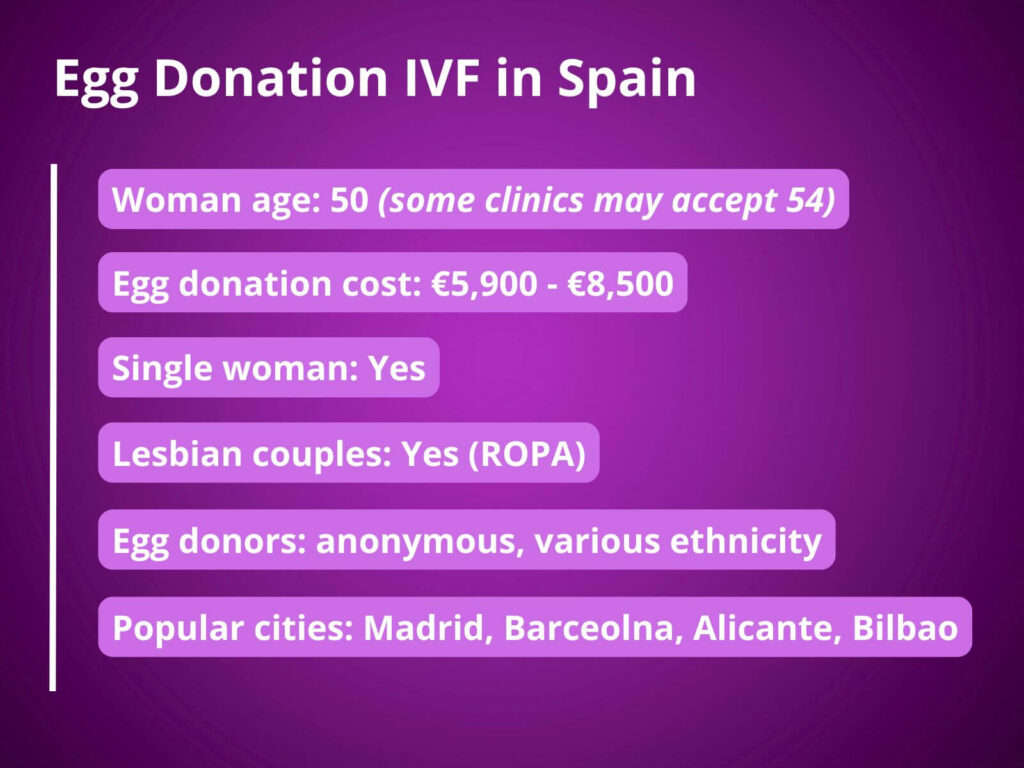Egg Donation and IVF in Spain – all you need to know
Choosing Spain for Egg Donation and IVF treatment
Why is Spain a popular destination for egg donation?
Spain is a leading destination for egg donation and IVF with thousands of international patients travelling to Spain each year. Couples and individuals are attracted by the country’s cutting-edge medical infrastructure, high success rates and affordable prices, starting at €5,000 for a cycle. Waiting times are one of the shortest in Europe, and the Spanish legal framework is favorable to both egg donors and recipients, making the egg donation process as smooth and discreet as possible. Spanish law protects the anonymity of both parties, and the country also has one of the largest pools of young, healthy egg donors.
What makes Spain an ideal destination for IVF?
Spain is one of the best places in the world to undergo IVF, especially with donor eggs. The country’s top fertility clinics perform over 100,000 treatments each year, with some of the highest success rates in Europe, and internationally recognized experts. The legal environment is also welcoming, allowing single women and same-sex couples to get fertility treatment to complete their families.
Spain and its clinics offer cutting-edge reproductive technology, personalized care, and multilingual support. With short or no waiting times and the opportunity to recover in a beautiful, relaxing environment, Spain is the ultimate destination for IVF treatment with own or donor eggs.
Why do people travel to Spain for fertility treatments?
Individuals and couples travel to Spain for fertility treatments because of the country’s advanced medical facilities, one of the highest success rates in Europe, affordable prices and programs, and medical facilities with a wide range of assisted reproductive technologies available. Spain offers access to treatments like IVF with own and donor eggs, often with shorter waiting times and a large pool of donors. International patients also appreciate the personalized care, multilingual staff, and welcoming atmosphere.
Additionally, the opportunity to combine world-class fertility treatment with a relaxing break in one of Europe’s most beautiful countries makes Spain a preferred choice for fertility treatments.
How does Spain compare to the UK for IVF treatment?
Spain is often considered a more attractive option for IVF treatment compared to the UK due to its advanced medical technology, higher success rates (which can be as high as 70% or more), prices starting from €5,900 for IVF with donor eggs (per cycle), and greater availability of treatments such as egg and sperm donation. The country has a well-established system of egg and sperm donation, which means that waiting times are shorter and there is a wider choice of donors.
Fertility treatments in Spain are often less restrictive, allowing for options like double donation or embryo adoption, which may not always be available in the UK. Many international patients also prefer Spain for its patient-centred approach, multilingual staff, affordable prices, and the opportunity to combine treatment with a relaxing break in a sunny and beautiful destination.
Which Spanish cities are known for quality IVF clinics?
Some of the best fertility clinics in Spain are located in Barcelona and Madrid — cities which have the most modern facilities with the latest technology and the most experienced experts. Valencia and Alicante also have excellent clinics that provide the best care for international patients. Málaga, a beautiful coastal city, is also a popular destination for fertility treatment, offering a unique combination of top quality procedures and a relaxing atmosphere.
What are the advantages of choosing egg donors in Spain?
Choosing egg donors in Spain offers several advantages. The country has a diverse donor pool that increases the chances of finding a perfect match, both physically and genetically. Each donor is thoroughly screened for medical and psychological suitability. Spain’s legal system also ensures the anonymity of donors and the privacy and security of both donors and recipients.
Spain’s laws do not impose any restrictions on single women, same-sex couples and heterosexual couples who want to undergo fertility treatment.
What are the benefits of having egg donor IVF in Spain rather than the UK?
Undergoing egg donor IVF in Spain offers several advantages over the UK. Spanish clinics have a larger pool of egg donors, allowing for a better chance of finding a suitable match and significantly shorter waiting times. Spain’s legal framework protects the anonymity of donors, which is mandatory and provides privacy and security for both donors and recipients, unlike the UK, where donors can be identifiable.
Spanish clinics also have the latest technology and some of the highest success rates in Europe. Clinics offer more competitive prices than UK clinics. Many patients also appreciate the personal care they receive and the opportunity to undergo treatment in a beautiful destination while enjoying Spain’s sunny climate and cultural attractions.
What makes Spain’s regulations more favorable for fertility treatments?
Spain’s regulations are considered more favorable for fertility treatments, because regulations are clear and patient-focused. The country allows a wide variety of assisted reproductive techniques, including egg and sperm donation, embryo adoption, and fertility preservation. Treatments are available for diverse patient groups, including single individuals and same-sex couples.
Donor anonymity is strictly enforced and ensures privacy for egg donors and recipients. Additionally, there are no upper age limits for receiving IVF treatment, and fertility specialists can make individualised decisions about each patient’s individual case.
Are there cultural or language barriers for international patients?
Cultural or language barriers are minimal and many fertility clinics in Spain offer treatments designed specifically to international couples and individuals, with multilingual staff who speak English, French, German and other languages.
IVF and egg donation costs and affordability in Spain
How much does IVF with egg donation cost in Spain?
The cost of IVF with egg donation in Spain typically ranges from €6,500, although this can vary depending on the clinic and the specific treatment plan. This price often includes medical consultations, the egg donation procedure, embryo transfer, and follow-up care. However, additional costs may apply if needed.
Many Spanish clinics offer packages that cover most of the treatment, helping to provide a clear understanding of the overall expenses. When compared to other countries, Spain is considered a more affordable destination for egg donation IVF, while still maintaining high standards of treatments quality and care.
How does the cost of IVF in Spain compare to other countries?
On average, IVF treatment in Spain costs between €4,000 and €7,000. In the UK, the cost can range from €5,500 to €9,000, and in the US, it can exceed €11,000 to €14,000 per cycle.
Many patients often find that they can receive excellent treatment at a lower cost compared to other leading fertility destinations, without sacrificing quality or treatment success rates.
Is IVF more affordable in Spain than in other countries?
Yes, IVF is generally more affordable in Spain compared to other countries. The average cost of IVF with own eggs in Spain starts from €4,000 per cycle, while the same treatment can cost from €8,000 in countries like Germany or France. IVF with donor eggs in Spain starts from €5,900 per cycle compared to £10,000 in the UK, $15,000 in the US, CAD 10,000 ($7,400) in Canada, AUD 10,000 ($6,800) in Australia.
Are there any hidden costs in IVF packages offered in Spain?
IVF packages in Spain may have additional costs. While many clinics offer all-inclusive packages, review the details of the package to be sure that all costs are clearly outlined.
What financing options are available for IVF in Spain?
Financing options for IVF in Spain vary depending on the clinic, but most IVF centers offer a variety of payment plans to help make treatment more affordable. Some clinics offer installment plans, which allow international patients to pay for treatment in installments over several months. Some patients also use health insurance that covers fertility treatments.
Some Spanish clinics also offer money-back or refund programs (full or partial) as a payment option, giving international patients peace of mind and greater flexibility.
Egg Donors and Screening in Spain
Are egg donors in Spain anonymous?
Yes, egg donors in Spain are anonymous. Spanish law requires that the identity of egg donors be kept confidential, protecting the anonymity and privacy of both parties. The donor and recipient are not allowed to have any contact with each other. This legal framework is one of the reasons why Spain is a popular destination for IVF with egg donation.
What are the requirements for egg donors in Spain?
In Spain, egg donors must meet specific requirements. The donor must be between 18 and 35 years old, they must also be in good health, both physically (free of chromosomal abnormalities and infectious diseases such as HIV, Hepatitis B and C, Syphilis, and other sexually transmitted infections) and mentally. Donors also must undergo a comprehensive medical and psychological examination.
The family history of donors is also carefully evaluated. Donors are required to have no own and family history of genetic disorders (a total of more than 2,300 genes are screened), or serious illnesses. Spanish law also requires that all egg donors remain anonymous, and cannot receive financial compensation other than expense reimbursement. The law also limits the number of children that can be born from a single donor to 6 (six), and allows a donor to donate every three to four menstrual cycles.
How does the availability of donors in Spain compare to other countries?
Spain is one of the best destinations for IVF egg donation in Europe with thousands of cycles per year. Spanish clinics have short or no waiting lists (in comparison to longer waiting times in the UK and Australia), and the diversified pool of egg donors with different backgrounds.
How are egg donors recruited?
Egg donors in Spain are typically recruited through fertility clinics and egg donor agencies that operate under strict ethical and legal guidelines. The organizations use a variety of methods to recruit egg donors, including online advertising, social media, community outreach, and personal referrals.
How are egg donors screened and assessed?
Egg donors in Spain undergo a thorough screening and assessment process including checking a personal and family medical history, physical examination (including height, weight, and blood pressure). The process also includes a psychological evaluation to ensure that the donor is mentally prepared and understands the decision.
The selection also includes comprehensive genetic testing to screen over 2,300 genes to reduce the risk of genetic diseases. Egg donors undergo medical examinations including screenings for infectious diseases, hormone levels, and overall health. Additionally, lifestyle habits such as smoking, alcohol consumption, and drug use are also evaluated.
Are there health requirements for egg donors in Spain?
Yes, the health criteria for egg donors are very strict. In Spain, the donor must be between 18 and 35 years old, they will undergo a thorough medical examination and a full health check to ensure that donors are physically healthy. The egg donor must also have normal hormone levels and no personal or family history of genetic disorders or chronic diseases.
The donor’s lifestyle is thoroughly assessed, with careful evaluation of smoking, alcohol consumption, and drug use.
What is the average compensation for egg donors in Spain?
Egg donation in Spain differs from the processes in other countries by its approach to compensation.. Egg donors do not receive any payments for their donation; they receive reimbursement from €800 to €1,500 for expenses related to the process such as medical examinations or time off work.
Spanish law does not allow any payments beyond these expenses, guaranteeing that the egg donation remains altruistic and ethical.
How do Spanish fertility clinics ensure donor anonymity?
Spanish fertility clinics protect the anonymity of their donors through legal and ethical measures. Donors identities are never disclosed to recipients or to any third parties, and clinics do not allow any direct contact between the donor and the recipient.
The donor records are only identified by a code. This approach protects the rights and privacy of all parties involved.
What ethnic backgrounds are available for egg donors in Spain?
Egg donors in Spain come from a variety of ethnic backgrounds, including Spanish, Mediterranean, Latin American and North African.
While the majority of donors are of European background, Spanish fertility clinics always try to match a recipient with a donor of similar ethnic or physical characteristics (such as skin tone, hair color, and eye color) to ensure the best possible match. They will also provide information about the donor’s ancestry so that the recipient can make an informed decision.
How are donors’ genetic profiles evaluated?
In Spain, egg donors undergo a rigorous screening process that includes genetic testing for common hereditary conditions, genetic disorders, and chromosomal abnormalities that could potentially affect the health of a child. Clinics also review the donor’s medical history to assess the risk of inherited diseases.
What are the typical characteristics of egg donors in Spain?
A typical egg donor profile reflects a perfect balance of demographics, education and lifestyle. Donors, usually between 18 and 35 years old, are well-educated and lead a healthy lifestyle.
Egg Donation and Matching Process in Spain
What is the process for egg donation in Spain?
Egg donation in Spain is a highly regulated and confidential process that protects both the donor and the recipient. Egg donors are thoroughly evaluated medically and psychologically, and each recipient is matched with a donor based on physical and genetic compatibility, while maintaining the donor’s anonymity.
Once the ovarian stimulation process is complete, the donor’s eggs are retrieved and fertilized in a laboratory. The embryos are then transferred into the recipient’s uterus, and any remaining embryos are cryopreserved for future use. Spain’s strict ethical guidelines ensure donor safety, fair compensation, and high-quality care throughout the process.
What is the process for matching with an egg donor in Spain?
Matching with an egg donor in Spain is a regulated and anonymous process. Fertility clinics play a key role in matching donors and recipients, taking into account a range of factors such as hair and eye colour, height, ethnicity, blood type and genetic compatibility.
The clinic manages every aspect of the process, from screening donors for medical, psychological and genetic health to finding the right match for the recipient. Recipients can trust that donors meet strict criteria, and that the clinic will make the process smooth and ethical.
How long does the egg donation process take in Spain?
The egg donation process in Spain typically begins with an initial consultation and screening of donors. (approx. 1-2 weeks). The timeline may vary depending on the recipient’s readiness and the availability of a donor, but generally, it is quite short with minimal waiting time.
Once the donor and recipient are matched, the donor will undergo ovarian stimulation (approx. 10-14 days), and the eggs will be retrieved and then fertilized (5-7 days). At the same time, the recipient’s uterus will be prepared for the embryo transfer. which occurs approx. 12 days after the fertilization stage. Fertility clinics will work to make this process as smooth as possible particularly for the international patients.
How long does the matching process take?
The matching process with an egg donor in Spain can vary depending on the recipient’s specific preferences and medical needs. Factors such as physical characteristics, blood type, and genetics can all impact the process, but Spain is known for having some of the shortest waiting times in Europe.
Will patients be given multiple options of donors to choose from?
Yes, patients have a wide range of donor options available to them, as fertility clinics maintain a database of donors who have been thoroughly screened and selected for their diversity. Recipients can choose from a variety of donors based on physical characteristics, blood type, and others.
Are there any limits on the number of families that can be created using donor’s eggs?
Yes, Spain has strict legal measures to ensure that donors are used ethically. The Spanish law limits the number of families that can use the eggs of a single donor to 6 (six).
How does it work if I wish to use the same donor for siblings for their child in the future?
If you wish to use the same egg donor for siblings in the future, discuss this with your fertility clinic.
Many fertility clinics recommend saving additional eggs from your donor during your initial cycle to guarantee availability for future use. Since donors can sometimes become unavailable, securing eggs in advance is a proactive step. Ask your clinic about the donor’s availability for future pregnancies, as donor availability and clinic policies can change over time.
Can recipients bring their own egg donor to Spain?
Yes, recipients can bring their own egg donor to Spain, but this depends on the policies of the specific fertility clinic. Some clinics may allow patients to use an own donor, while others may require patients to use one of the clinic’s donors due to legal or logistical restrictions. Have a consultation with the clinic to understand their policies, requirements, and restrictions.
What are the options for using donor eggs with genetic testing?
When using donor eggs with genetic testing, options include pre-implantation genetic testing, which screens embryos for genetic conditions before implantation. Many clinics also offer carrier screening for donors to check for common genetic disorders.
IVF Success Rates and Risks in Spain
Why is IVF more successful in Spain?
IVF is more successful in Spain due to several factors. The country boasts advanced medical technologies and state-of-the-art facilities, which contribute to higher success rates. Spanish clinics employ highly experienced specialists who are leaders in reproductive medicine. Additionally, Spain’s comprehensive legal frameworks support a wide range of fertility treatments, including those involving donor eggs and sperm. High standards of patient care, personalized treatment plans, and short waiting times also enhance the overall success of IVF treatments in Spain.
How successful is IVF in Spain with donor eggs?
Spain is one of the leading countries for IVF with donor eggs, with some of the highest success rates in Europe, with some clinics boasting success rates of 70% and above.
Spain is known for its cutting-edge technology and has strict regulations to ensure the top quality of egg donors. However, success rates can vary from clinic to clinic, so to do your research and choose a reputable clinic with experienced staff.
What are the typical success rates of donor egg IVF in Spain?
The average success rate for donor egg IVF in Spain is one of the highest in Europe. Average success rates vary depending on a number of factors, including the recipient’s age, health or the clinic’s experience. While rates differ between clinics, top Spanish fertility clinics report the average success rate of 65% and above for the first transfer and over 90% for the second.
What is the success rate of egg donation in Spain?
Egg donation in Spain is a popular choice for international couples and individuals because of one of the highest success rates in Europe with top fertility clinics reporting success rates of 70% and higher.
What are the risks associated with egg donation in Spain?
Egg donation in Spain is generally considered safe as it is monitored and regulated by the law. However, egg donors may experience side effects from the medications they take, emotional distress or feel that they were not adequately informed about the risks or procedures involved. Recipients may have concerns about genetic issues and the low risk of health problems.
How do Spanish clinics improve success rates for older patients?
Spanish clinics improve success rates for older patients by using high-quality donor eggs from young and healthy donors, and tailor their treatment protocols to each individual. Centers offer personalized counseling and support, using the latest reproductive technology and equipment. Spanish fertility experts also continually update their knowledge to manage age-related fertility issues.
Are there specific protocols in Spain that reduce IVF risks?
Spanish clinics follow specific protocols to reduce IVF risks which include strict screening of egg donors, using advanced techniques to minimize the risk of multiple pregnancies or genetic diseases, designing tailored protocols, meeting the requirements of European Society of Human Reproduction and Embryology (ESHRE), and others.
IVF Age limit and eligibility in Spain
Are there age limits for IVF treatment in Spain?
In Spain, the age limit for IVF treatment varies depending on the clinic and the type of treatment. Spanish law does not regulate the age limit, and clinics provide treatments for patients of 43-45 years using their own eggs, with some clinics accepting patients aged to 50 years.
For women using donor eggs, there is no age limit, but most Spanish clinics and The Spanish Fertility Society (SEF) agree that the ideal age for women is under 50 years to guarantee the best chances of success.
What is the maximum age for egg donation in Spain?
In Spain, the maximum age for receiving egg donation treatment is generally around 50 years old. While there is no strict legal age limit, most Spanish clinics require women to be under 50 to ensure the best chances of a successful pregnancy. Some clinics may accept patients 50+, but each case is evaluated based on the individual’s health and the clinic’s policies.
Can women over 45 undergo IVF with donor eggs in Spain?
Yes, women over 45 can undergo IVF with donor eggs in Spain. While most fertility clinics typically recommend that women be under 50 for the best chances of success, many clinics will treat women over 45.
Will the recipient legally be the child’s parent?
Yes, in Spain, the law is clear: the recipient is the child’s parent. The recipient has full parental rights, and the egg donor has no legal rights to the child.
Spanish law also protects the anonymity of the donor. Once the embryo is implanted, the recipient is legally the mother of the child. The recipient’s partner, if applicable, can also be recognized as the child’s legal parent, following the appropriate legal processes.
What is the average age of women undergoing egg donation in Spain?
The average age of women who travel to Spain for egg donation is between 40 and 45 years old; however, women up to 50 years old may also undergo IVF with egg donation treatment. Age is one of the factors in IVF success rates, so clinics will tailor their approach to the individual’s health and fertility status to get a successful result.
Are single women eligible for IVF with donor eggs in Spain?
Yes, single women can also undergo IVF with donor eggs in Spain. The process is similar to that of couples, with clinics providing access to donor eggs and donor sperm, as well as support throughout the process.
Are there any IVF clinics in Spain that specialize in LGBTQ+ families?
In Spain, there are some fertility clinics offering treatment for LGBTQ+ families, however please note only same sex female couples are eligible for IVF treatments in spain.
IVF Treatment Details in Spain
Can international patients access egg donors in Spain?
Yes, international patients can access egg donors in Spain. The country is one of the most popular destinations for fertility treatment in Europe, with thousands of patients traveling every year. Clinics typically provide support throughout the process, which may include coordinating travel, legal documentation, and treatment plans.
How many appointments will the recipient need to travel to Spain for?
The number of appointments a recipient needs varies, but typically, minimum two trips are required. The first trip will usually involve consultations, screening, medical evaluations and hormone treatment, giving patients the opportunity to meet their fertility team.
The second trip will be for the embryo transfer procedure. Some patients may also need to attend additional monitoring appointments, although many clinics now offer remote consultations.
What are the average waiting times for IVF treatments in Spain?
Spanish IVF clinics offer short or no waiting time treatments that means international patients can receive treatment in as little as a few days or even immediately after the first consultation.
What are the most innovative IVF treatments available in Spanish clinics?
Spanish clinics use advanced techniques in IVF treatments such as latest IVF techniques, including ROPA, PGT, advanced cryopreservation, and regenerative medicine, depending on the patient’s needs.
How do you guarantee a blastocyst in Spain?
In Spain, fertility specialists use advanced embryo culture techniques and timelapse incubation technology to increase the chances of reaching the blastocyst stage. Some clinics also offer guarantee programs and/or provide genetic screening. Egg donors are carefully selected and treatment protocols are customized to guarantee the best results.
Is it better to have a fresh embryo transfer rather than a frozen one in Spain?
Whether a fresh or frozen embryo transfer is better depends on individual factors and should be discussed with a fertility expert. Another factor to consider is how many times international patients are ready to visit Spain. Both options have their advantages and disadvantages, but Spain has consistently shown impressive success rates for both fresh and frozen embryo transfers.
What happens if our first cycle isn’t successful in Spain?
If your first egg donation cycle isn’t successful, it’s important to know that this is not uncommon and there are several steps you can take. First, your fertility specialist will carefully review the cycle to determine what may have caused the outcome and develop a plan for moving forward.
Spanish clinics also offer IVF guarantee (refunding) programs including money-back guarantees, refund programs, and comprehensive packages that are valuable options for patients looking for financial security.
Can you choose the gender of your baby with IVF in Spain?
Gender selection for non-medical reasons is now allowed in Spain. Spanish fertility laws allow gender selection in IVF for medical reasons, such as preventing a genetic disorder.
What support services are available for international patients in Spain?
For international patients, Spanish fertility clinics typically offer a range of support services. This includes help with travel arrangements, hotel recommendations, and transportation to and from the clinic and local hotels, and others. Many clinics have dedicated coordinators who speak multiple languages, so international patients can be confident that they will be able to understand the treatment process.
Some clinics also offer remote consultations and monitoring, which can greatly reduce the need for travel. Patients can expect to receive personalized care and emotional support, tailored to their individual fertility needs. Legal assistance is also available to help with the paperwork required under Spanish law and regulations.
How does the psychological support provided in Spanish fertility clinics enhance the IVF process
The psychological support provided in Spanish fertility clinics helps patients through the IVF process by building emotional resilience, reducing anxiety, offering personalized care, educating patients, and integrating mental health with medical treatment. This holistic approach not only improves patient satisfaction but also positively impacts treatment outcomes, making psychological support an essential part of fertility care in Spain.
Can recipients freeze embryos for future use in Spain?
Yes, patients can freeze embryos for future use thanks to the advanced cryopreservation techniques used by fertility clinics. Patients can decide how they wish to use or manage them in the future.
Legal and Ethical Considerations in Spain
What kind of IVF treatment is legally allowed in Spain?
As Spain offers one of the most liberal IVF legislations in the world, IVF treatment is allowed for single women, married heterosexual and female homosexual couples equally. However, there is the legal age limit for female patients and it is 50 years old. Egg/sperm/embryo donation is allowed and anonymous – donor and patient identities are strictly guarded by the clinic. Social freezing of eggs is permitted, as well as embryo freezing. The same refers to the procedures such as ICSI, PGS, PGD or assisted hatching. The maximum number of embryos to transfer in both IVF with own eggs and IVF with donor eggs is 3. Lesbian couples are offered the ROPA method (Reception of Oocytes from Partner), known as “shared motherhood”.
What major laws are regulating IVF treatment in Spain?
The main piece of legislation regulating the conditions of IVF and other fertility treatments in Spain is the Law 14/2006 (of May 26), on human assisted reproduction techniques. Additionally, the Royal Decree Law 9/2014 dictates the quality and safety standards for the donation, handling and processing of human tissues and samples (oocytes, sperm, and embryos) as well as establishes operating protocols for working with patients.
Are there legal restrictions on egg donation in Spain?
Egg donation in Spain is regulated by strict laws to ensure safety and ethics. Egg donations are anonymous, voluntary and altruistic. Donors are paid for their time and expenses, but not for the donation.
Egg donors must meet strict health and age criteria, usually between 18 and 35 years, and undergo medical and psychological screening. Recipients get the full legal parenthood of any resulting child while donors have no legal rights or responsibilities.
What rights do egg donors have in Spain?
In Spain, egg donors have specific rights protected by law and their anonymity is guaranteed. They are allowed to give their informed consent before the procedure and can withdraw their consent at any time before the eggs are used.
Egg donors are also allowed to be compensated for their time and effort, and this compensation is strictly regulated. Donors also have the right to comprehensive medical and psychological evaluations to ensure their health and well-being throughout the process. Egg donors do not have any parental rights or responsibilities regarding the resulting child, as legal parenthood is granted to the recipient.
How does Spain’s anonymity policy compare to other countries?
Spain has a very different approach to anonymity in egg donation compared to other countries. Under the strict rules, both the donor and the recipient are completely anonymous, unlike the UK where children can find out who their donor is when they turn 18, or the US where semi-open arrangements are allowed. The rules are set out in Law 14/2006 on Assisted Human Reproduction Techniques and state that a donor’s identity can only be revealed in exceptional circumstances.
However, while anonymity is guaranteed in Spain, there are some exceptions. The law states that the confidentiality of the donor can be broken if the health or safety of the resulting child is at risk.
Are there any exceptions to the anonymity of egg donors in Spain?
In Spain, the anonymity of egg donors is a primary standard established by law that allows for exceptions when the health or safety of the child is at risk.
Are there ethical guidelines followed by clinics in Spain?
Yes, fertility clinics in Spain follow strict ethical guidelines regulated by Spanish law. These guidelines ensure that all treatments, including egg donation and IVF, are carried out safely, transparently, and ethically.
Can donor-conceived children access information about their donors in Spain?
No, donor-conceived children in Spain cannot access identifying information about their donors. The law maintains a strict policy of anonymity for egg and sperm donors, prioritizing their privacy above all else.
What information is provided to recipients about the egg donors?
In Spain, international patients can get information about donors, including age, height, weight, hair color, blood type, and a general overview of health and medical history, along with psychological assessment results. Although recipients receive this general information, they do not have access to identifying details about the donor.
Travel and Logistics in Spain
What travel arrangements are necessary for international patients?
For international patients traveling for medical treatment, several key arrangements are essential. Contact the medical facility and ask for recommendations on treatment and confirm the date of your appointment. Patients should bring medical and treatment records, and having health insurance can be beneficial in some cases. Payment details should be arranged in advance to secure the booking. Travel plans usually involve booking flights to a nearby city and arranging accommodation for a few days or several weeks, depending on the treatment schedule.
Individuals and couples should have a valid passport, visa (if necessary), and flight tickets. Many clinics will help international patients with airport transfers, suggest accommodation and provide translation services.
How long should international patients plan to stay in Spain for treatment?
The length of stay for international patients in Spain depends on the type of treatment. For most fertility treatments, especially those undergoing IVF with donor eggs, patients typically need to stay for 5 to 7 days for the embryo transfer process.
If multiple visits are required, the first visit and preparation may require a short stay, while the second visit for the transfer may require a longer stay. Some clinics are now offering remote monitoring and preparation, which can minimize travel time.
What documentation is needed for IVF treatment in Spain?
IVF treatment in Spain requires patients to provide documentation, including a valid passport or national ID, medical records that include information about previous fertility treatments, tests, or diagnoses, and signed consent forms. Proof of payment or health insurance may also be required.
Are interpreters or language assistance available for international patients?
Yes, interpreters and language assistance are typically available at Spanish fertility clinics which offer services in multiple languages, including English.






